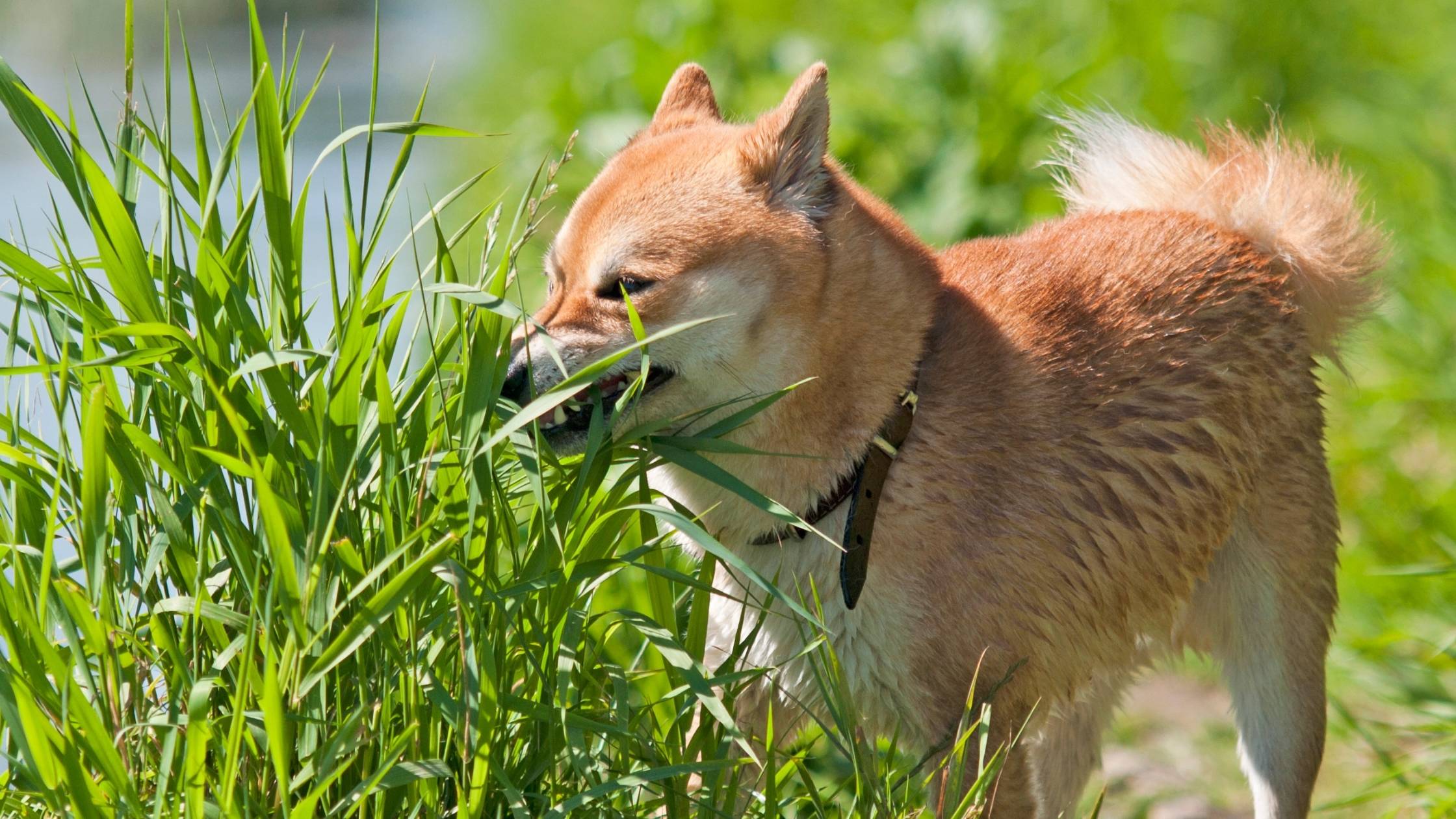Last Updated on 07/06/2021 by Veronica Jones
Any dog owner will tell you: dogs do the weirdest things. Why do dogs sit on you? Why do dogs lick everything? Why do dogs howl along to your favorite TV theme tune? Why do dogs feel the need to lie across your chest and suffocate you when the rest of the couch is free?
One question that’s weird but sometimes worrying is, why do dogs eat grass? Vets and dog owners will confirm, it’s extremely common for our canine companions to enjoy a nibble on grass from time to time. Whether it’s a well-kept lawn or a ragged wild grassland, our friends don’t really mind.
The real question is, should we? Say we find our beloved canines going in for these culinary, erm… delights? Should we allow them to savor them to their bark’s content? How do we know what’s at the grass roots of this behavior? Is it something we should train them out of, or something we should let be?
From digestion to distraction, here’s a lowdown on our pooches’ peculiarities.
Why Do Dogs Eat Grass?
There’s no simple answer to this. Some dogs do throw up after eating grass, but the majority do not. It could also be to meet certain nutritional needs or to settle their stomach. It’s difficult to tell for sure, and there may not be one simple answer for all dogs who eat grass.
Since so many dogs eat grass, and many will throw up shortly afterwards, it’s often believed that dogs may be eating the green stuff as a natural means of settling an upset stomach.
However, this common belief should be taken with a pinch of salt. The evidence is actually that less than a quarter of dogs throw up after eating grass, and even fewer, only 1 in 10, showed signs of sickness before eating the grass. Let’s also remember that even if your dog does eat grass and then throw up, this doesn’t prove that she needed to eat the grass in order to throw up and settle her stomach. It could just be that she chose to eat the grass for other reasons, and her tummy took a turn for the worse as a result.
But this still doesn’t rule out the possibility that (in some cases) she did need to eat the grass in order to bring it back up and settle her belly.
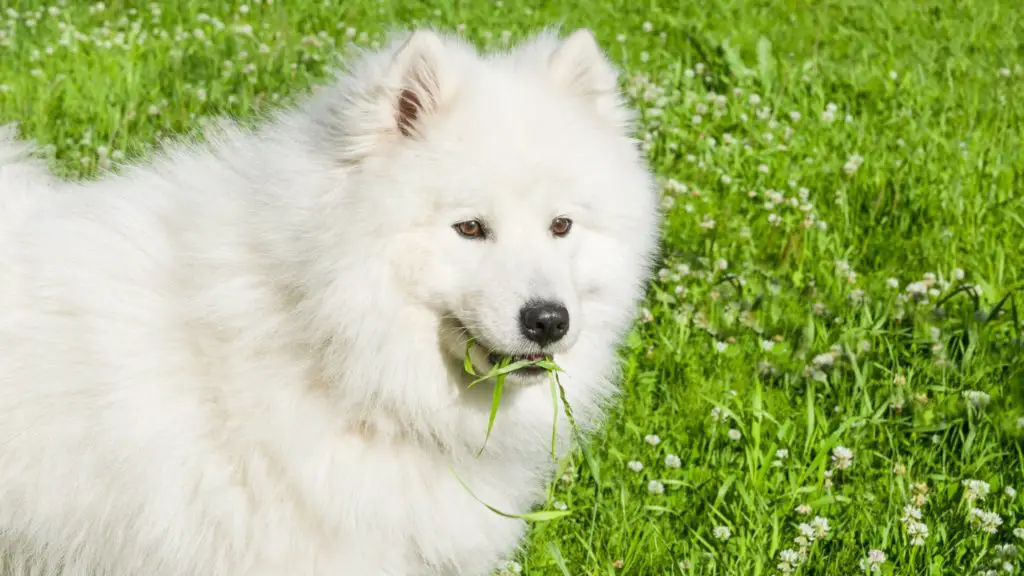
So, is it healthy to let them?
The simple answer here is that… there is no simple answer. If your dog only occasionally eats grass and promptly throws it up, this may not be any particular cause for concern.
However, if he’s doing this a lot, it’s time to bring it up with his veterinarian. He may have an underlying stomach problem or a nutritional deficiency. Again, his grass-munching may be his way of trying to deal with his upset stomach, or the vomiting itself may simply be a sign that something’s not quite right.
Either way, if he’s often eating grass and bringing it up, ask your vet to check him out and advise you further on what could be going on. Your vet may also be able to help you review your dog’s diet, and whether there is anything different you should be feeding him.
Do they need the fibre?
Grass is rich in fibre. Although it may not be our first choice as humans when it comes to topping up our fibre intake, dogs are less choosy than their human masters. If they’re often eating grass, it could be a sign that they are trying to supplement their fibre intake.
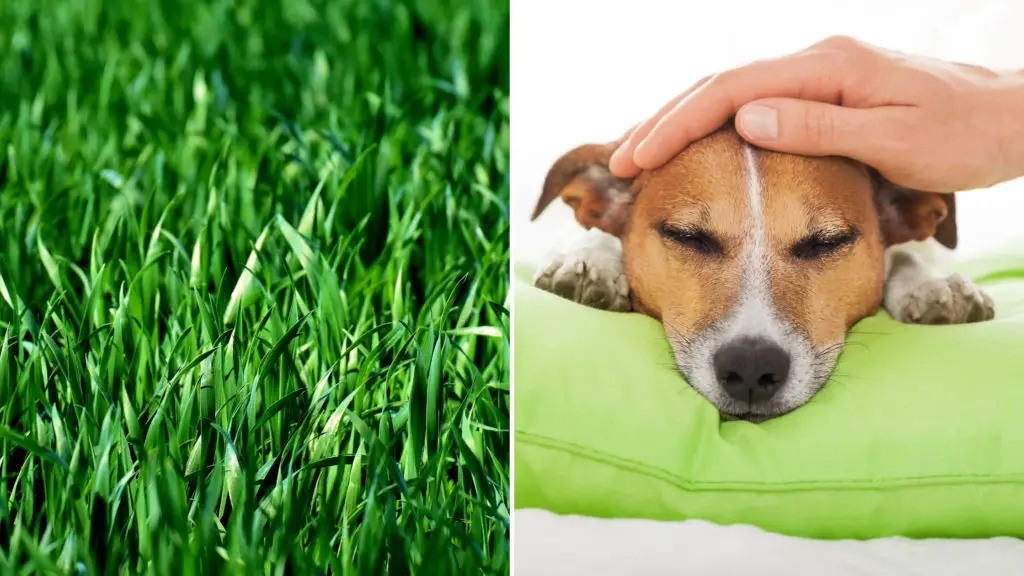
We need to remember that even our modern domesticated canine friends, however well adapted they are to human ways of life, and however close we feel to them, are descended from their wild ancestors. So they are very much programmed accordingly. In their ancient past, dogs in the wild would have eaten entire animals – even right down to the bones (yet another point on which dogs and humans may disagree about what makes a gourmet meal). Like wolves today still do, wild dogs would have eaten all the internal organs where the stomach of their prey would very probably contain a quantity of grass or plant foods.
This means that dogs are not simply carnivores by nature, but they need a balanced diet including the right intake of fibre. It’s very likely that in many cases our modern canines are seeking out exactly that when they go for the grass in our gardens.
Doesn’t dog food cover all dietary needs?
The short answer is yes, it should be, but you should still check. Modern commercial dog foods are designed to do just that, and cover all bases when it comes to the balance of nutritional intake that’s best for your dog. However, some breeds of dog need more fibre than others, so if you’re concerned that your dog is eating a lot of grass, it may be time to take her to the vet’s and let them assess the situation.
Getting enough fibre on board is essential for your dog, and brings multiple benefits. A good fibre intake ensures healthier bowels and colon, prevents constipation, and will help boost her immune system, reducing the chances of illness and infections. Remember that your dog is descended from wild ancestors who would have got a decent fibre intake from a variety of sources, including plant foods found in the stomachs of the animals they hunted.
If in doubt, you can ask your vet, and also check the labeling of your dog food to make sure that it’s high in insoluble fibre. This brings a great number of important benefits, and may also help your dog to manage her weight.
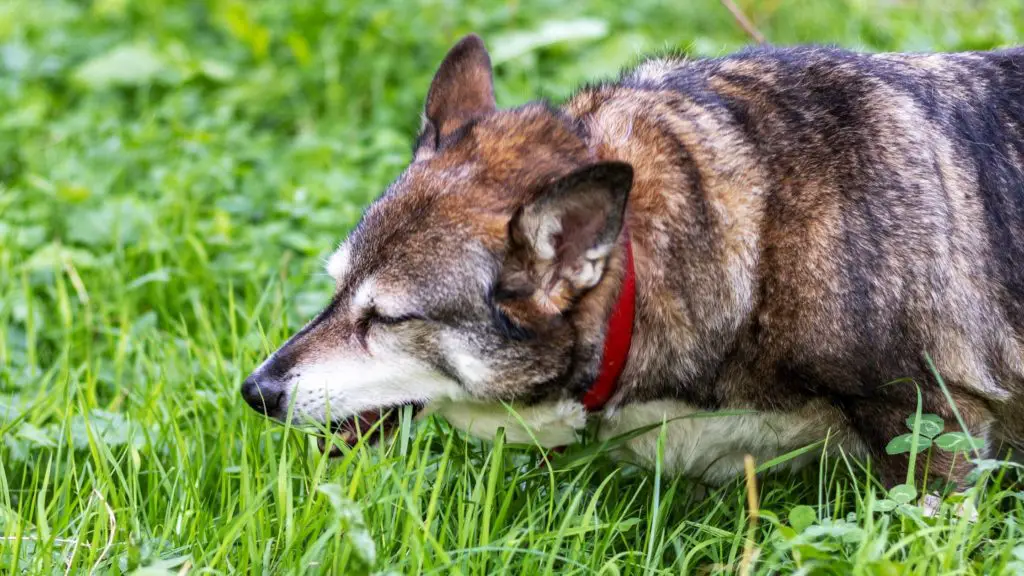
Could they just be bored?
There’s a reason for the expression, ‘man’s best friend’. Our loyal canines adore us, and they need our company as much as we need theirs. Let’s face it, in many people’s lives, dogs spend a significant amount of time waiting for Mom, Dad, George and Ringo to get home and give them that much-needed and well-deserved attention.
It’s very likely that some dogs turn to nibbling grass as a source of distraction to pass the time. Think about it. When you’re anxious or waiting, what do you do? Watch the clock? Tap your pen? Fiddle with your hair? If your dog is anxious, he may eat grass in the way that an anxious person may bite their fingernails.
So it could be time to block up that huge dog flap you have in your back door, or at least make sure the lawn is mown regularly. Or you could invest in some CCTV that allows you to talk to your dog remotely. Alternatively, if you’re really concerned, you could hire someone to pop in on your pooch throughout the day. Maybe even take him for a walk to distract him.
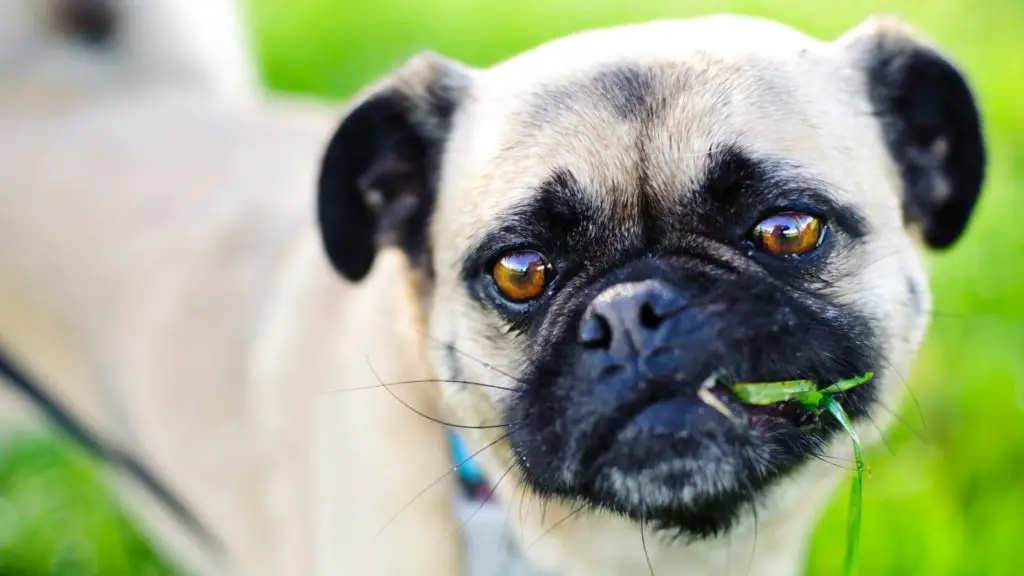
Should I try to stop her from eating grass?
In a word – or in two words – it depends. You should definitely not let your dog eat grass that may contain pesticides or chemicals, and don’t leave mown grass clippings lying around. These could develop mold after a time, which could be harmful if your dog ingests them into her stomach or even inhales them.
It’s also best to stop her from eating grass in public places where the grass may well contain parasites from the faeces of other dogs.
Other than that, the biggest alarm bells should be raised if your dog is eating a lot of grass, or very frequently eating grass, especially if she is often sick afterwards as well. Remember, whether she is eating grass in order to make herself sick, or whether she is simply being sick because of eating the grass, either way it’s worth asking your vet to check for possible underlying stomach or bowel problems that this may be indicating. Also remember to check her food and make sure it’s high in insoluble fibre, in case her grass-eating habit is trying to tell you that something is missing there.
What can I do to stop him eating grass?
Once again, check that dog food to make sure he isn’t trying to tell you that something’s missing from his fibre intake.
But as with so many aspects of loving and caring for your dog, distraction and play are often the main solution. Throwing balls and Frisbees are some of the obvious options to keep him busy and keep his teeth off the turf. Chew toys are also great – invest in a strong one that will keep him busy for longer.
And remember, as long as
- your dog is not eating up the whole of your backyard every day
- it’s more of an occasional thing
- you are sure that the grass contains no pesticides or parasites where other dogs may have pooped
- if vomiting is not a regular problem
then it may well be you have nothing to worry about. Why do dogs eat grass? Lots of reasons. As long as you’ve checked it’s nothing sinister, it’s probably just because dogs are weird. God love ‘em.

